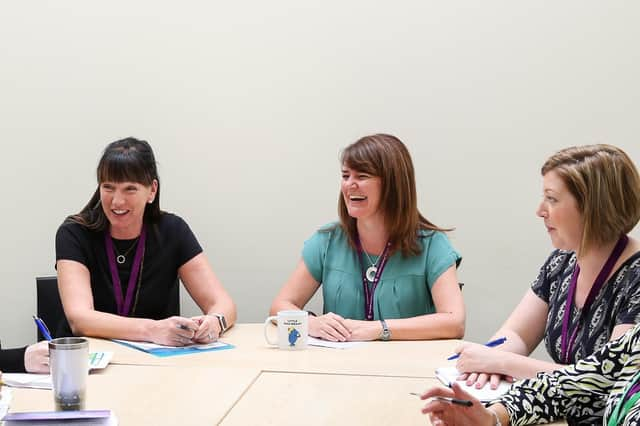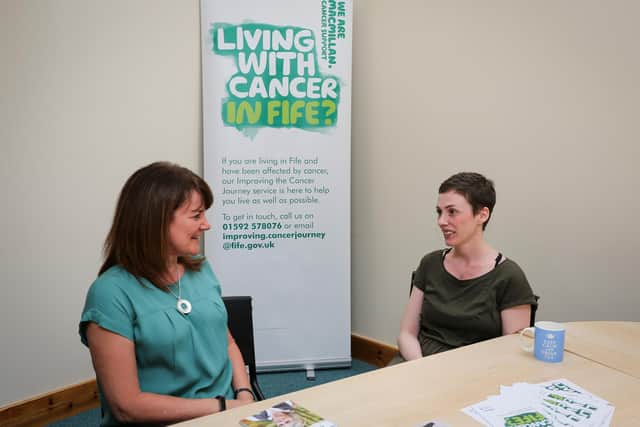Fife pioneers new service to support people living with cancer


The Macmillan Improving the Cancer Journey (ICJ) service launched in the region 12 months ago and aims to offer emotional, financial and practical support to everyone in the region diagnosed with cancer.
It helps people as they come to terms with the news which can engulf their world.
Advertisement
Hide AdAdvertisement
Hide AdWhile GPs and specialists focus on the treatment plan, the ICJ Service turns the patient back into a person - and focuses on what they want and need.


Every cancer journey is different, but the days of talk of fighting ‘the big C’ and beating cancer have long gone.
Today, more people are living with cancer - but they are also living well and for longer.
Barbara Boyd, from Kelty, who was diagnosed with cancer of the mouth summed up the service: “It’s not just a good thing - it’s a necessary thing.”The 62-year old said it gives people “the tools you need to go forward.”
And, those tools can be whatever is important to you.
Advertisement
Hide AdAdvertisement
Hide AdA cancer diagnosis is different for every single person, but it can have a profound impact on your life - from work to finances to family.
Barbara is just one of over 600 people have already been supported by the ICJ Service which operates Fife-wide which, like so many, has had to put face to face meetings on hold until the pandemic abates,
But, its support is needed more than ever.
Jaqui Stringer, service manager, said: “People can find a cancer diagnosis right now, in a pandemic, even more emotional. They may be on their own or isolated.
“A cancer diagnosis hits everyone. The focus is on the treatment and getting better, but you also have to look at getting back to work, your finances, and living with your diagnosis.
“Our service puts people first.”
Advertisement
Hide AdAdvertisement
Hide AdThe ICJ Service creates a plan which identifies what the person wants and needs, and it can be with them from the beginning right through to palliative care.
Added Jacqui: “There is so much to take in when you get a cancer diagnosis - when is the right time to ask for help?“A lot of people will never have used cancer services before, and for those unable to work they suddenly have to negotiate what they are entitled to.
“Our job is to signpost them to make sure they know what is available and also what they are entitled to.
“And, sometimes people just want someone to talk to outwith their GP or family.”
And it all starts with a letter.
Advertisement
Hide AdAdvertisement
Hide AdEvery newly diagnosed cancer patient in the region is written to offering a meeting with a dedicated one-to-one support worker.
They then help the patient access a wide range of support, from benefits advice and emotional support, to help at home and other practical needs.
Anyone currently living with cancer can also access the service by simply calling the team to arrange an appointment.
Jacqui said: “The aim is to empower people to live as independently as possible in their community.
Advertisement
Hide AdAdvertisement
Hide Ad“Some might not be able to go back to their jobs. They have worked all their life and have to start negotiating what is out there. They are going through enough without that. That is where the service can help.
“But it can cover emotional support, financial advice, and even down to how they make sure their dog gets walked every day.”
The service can define success simply - seeing people living as well as they can in the community, and getting back to living.
While not every person diagnosed with cancer may need help, the aim is to ensure everyone knows the service is there.
Advertisement
Hide AdAdvertisement
Hide AdGordon McLean, strategic partnership manager, said: “ICJ gives essential support to someone’s cancer journey and our interpretation is that we are going to see a hike next year in the use of the ICJ services because of Covid.
“We’re predicting an increase in people being diagnosed late and unfortunately that will mean a lot of people will be in the later stages of their cancer, as there will be a significant increase in required support.”
The importance of looking after a person’s non-clinical needs while doctors treat their cancer is well understood.
Added Gordon: “To be able to help and support the non-clinical needs of a person affected by cancer in return helps them manage and cope with the clinical side of things, and helps to reduce the feeling of being overwhelmed.”
Advertisement
Hide AdAdvertisement
Hide AdAs Barbara explained: ““When your treatment is finished there’s a feeling that you’re just set adrift. It’s important to be able to speak to someone who isn’t a specialist, a doctor or a nurse, and talk about the emotional side of it all - that’s a huge help.”She was one of the first people in the region to be helped by the ICJ service and has nothing but praise
“From day one I found it an incredible help and have since recommended it to other cancer patients,” she said. “They helped me talk about my experience with cancer in a non-clinical sense.
A clinical environment when you’re going through cancer, can be a little intimidating and perhaps make you reluctant to ask questions.
“ICJ provides you with the tools you need to go forward, how to access local support facilities, local needs, whether that be financial help or whatever.
Advertisement
Hide AdAdvertisement
Hide AdTo find out more contact (01592) 578076 or [email protected]